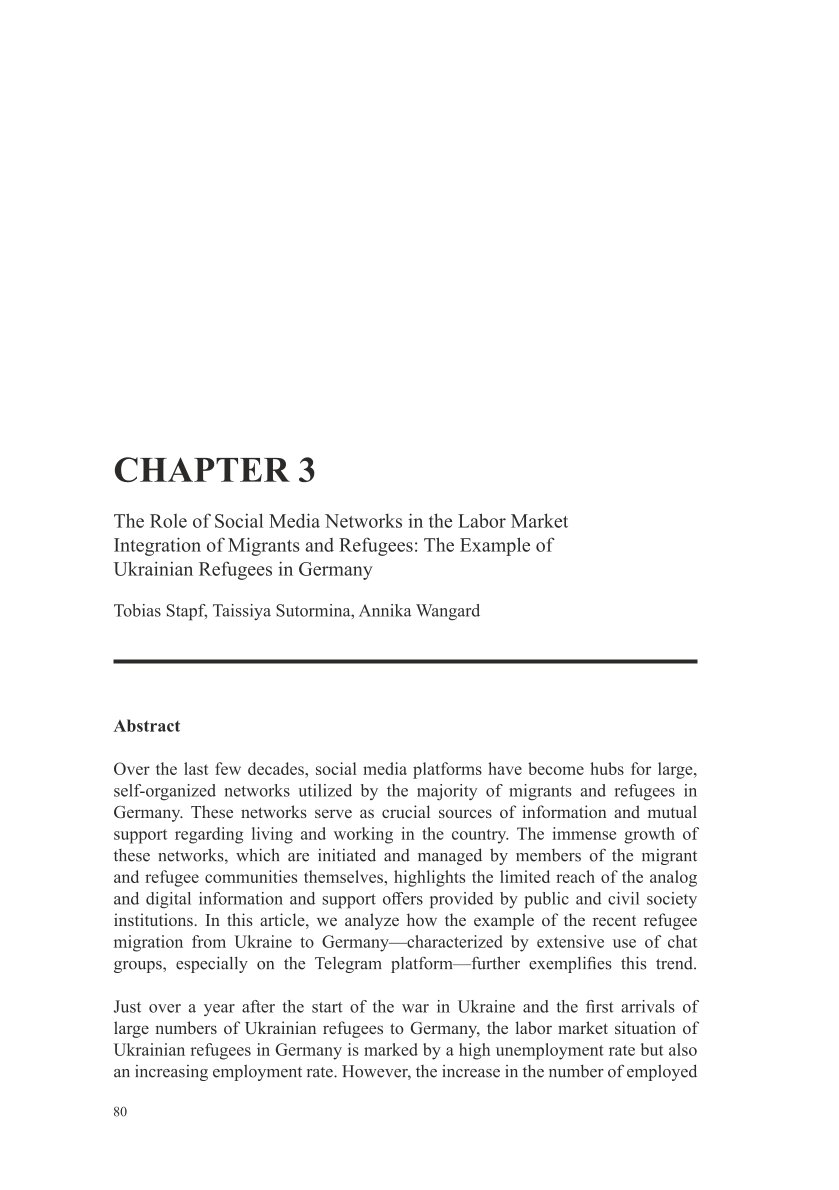The Role of Social Media Networks in the Labor Market Integration of Migrants and Refugees
The Example of Ukrainian Refugees in Germany
Tobias Stapf, Taissiya Sutormina, Annika Wangard, März 2024

Tobias Stapf, Taissiya Sutormina, Annika Wangard, März 2024
Over the last few decades, social media platforms have become hubs for large, self-organized networks utilized by the majority of migrants and refugees in Germany. These networks serve as crucial sources of information and mutual support regarding living and working in the country. The immense growth of these networks, which are initiated and managed by members of the migrant and refugee communities themselves, highlights the limited reach of the analog and digital information and support offers provided by public and civil society institutions. In this article, we analyze how the example of the recent refugee migration from Ukraine to Germany—characterized by extensive use of chat groups, especially on the Telegram platform—further exemplifies this trend.
Just over a year after the start of the war in Ukraine and the first arrivals of large numbers of Ukrainian refugees to Germany, the labor market situation of Ukrainian refugees in Germany is marked by a high unemployment rate but also an increasing employment rate. However, the increase in the number of employed Ukrainians appears to reflect, to a significant extent, an increase in Ukrainians working either in marginally paid employment or low-paid helper jobs. We seek to examine the role social media platforms play in this development.
Our social media data analysis reveals that job search-related topics are among the most popular discussions in social media forums used by Ukrainian refugees in Germany. Since the start of 2023, we have seen an increasing number of questions focused on German employment law and working conditions in different types of jobs. The large number of published employment opportunities in these digital networks range from precarious, low-paid positions to higher-skilled and lucrative jobs. Of particular concern is the large number of job offers that pay below the statutory minimum wage.
On the one hand, social media platforms positively facilitate labor market process for Ukrainian refugees by providing them with easy access to large amounts of information about employment law and job offers as well as peer-to-peer support. On the other hand, it is on social media that vulnerable refugees are exposed to precarious and sometimes illicit employment opportunities, which increases their risk of becoming exploited and facing even more precarity. To address this issue, we recommend stakeholders in the public, civil society, and the private sector develop multi-faceted strategies to a) combat the publication of illicit content via content moderation by the platforms and the group administrators; b) improve platform users‘ awareness of the risks via information campaigns; and c) increase the proactive outreach engagement of institutions offering legitimate employment offers with migrants and refugees directly on social media.
Kontakt:
Taissiya Sutormina
t.sutormina@minor-kontor.de
Weitere Informationen:
In: Interdisciplinary Migration Research with a Focus on New Technologies and Multiple Crisis: Relating Birds of Passage to Social Policies, Seiten 80-105
ISBN 978-3-98781-012-1
Dieser Artikel wurde im Rahmen des Projektes NexSM veröffentlicht.